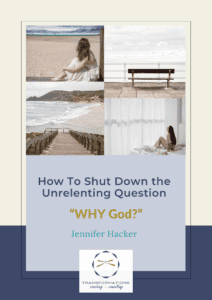Good Grief – by Granger Westberg
Book Summary by Jennifer Hacker
Good Grief by Granger Westberg (also known as the Westberg model of grief) is especially useful for those who don’t like to read or cannot concentrate long enough to get through a long book. This book is 64 total pages. You can finish it in less than an hour. It’s a quick read, easy to understand, and has actionable advice. But to save you the time of reading the book yourself, you can read my summary below. 🤓
Each chapter deals with one of the 10 stages of grief. The author says in his introduction: “Remember that every person does not necessarily go through all these stages, nor does a person necessarily go through them in this order. Moreover, it is impossible to differentiate clearly between each of these stages, for a person never moves neatly from one stage to the other.”
Stage One: We are in a state of shock. Of course we all know about this one. “Shock is a temporary escape from reality. As long as it is temporary, it is good.” The author says even after we come out of the initial shock, there will be times months and even years down the road when we still think, “I just can’t believe this has happened.” The biggest hurdle is to accept the loss emotionally. “We just do not want to believe it and so unconsciously we set as many barriers in the way as possible, making complete acceptance a very slow process.”
Stage Two: We express emotion. “Sometimes without warning there wells up within us an uncontrollable urge to express our grief. And this is exactly what we ought to do.”
Stage Three: We feel depressed and very lonely. When we find ourselves in utter despair, we should remind ourselves that this is to be expected following such a significant loss. It is a normal part of grief.
Stage Four: We may experience physical symptoms of distress. Some people say their arms literally ache for their loved one. Some people develop ulcers. Again, this type of physical pain is a normal part of grief.
Stage Five: We may become panicky. “We find ourselves becoming panicky because we can think of nothing but the loss.” Inability to concentrate in time of grief is perfectly natural. It would be unnatural if we could easily put aside our grief for routine matters. Feeling anxious and panicky does not mean you are going crazy so put that idea out of your head.
Stage Six: We feel a sense of guilt about the loss. Guilt is a natural response to a loss. But feelings of guilt are also oftentimes misplaced. We did not knowingly act in a way that would cause harm to our loved one. We did the best job we knew how to do and we should not feel guilty for being unable to predict this would happen or prevent it from happening.
Stage Seven: We are filled with anger and resentment. “When we have something precious taken from us we inevitably go through a stage when we are very critical of everything and everyone who was related to the loss.” We want someone to blame. We must be careful though because resentment, if allowed to take over, can be very, very harmful to us. “It is a normal part of the grief process … it is to be wrestled with, and it can, by the grace of God, be overcome.”
Stage Eight: We resist returning to our usual activities. We feel as though everyone else has forgotten our loss. We feel that somebody must keep the memory of our child alive. We don’t want to stop grieving because that might mean we have “gotten over” the loss or that we have let go of our loved one. Thus we feel we must not allow tings to “get back to normal.”
Stage Nine: Gradually hope comes through. “Now and then we get a little glimpse of hope in one experience or another.” We are never quite sure how long grief is going to last, but eventually we find that other experiences in life can be meaningful again.
Stage Ten: We struggle to affirm reality. First note that this is not the stage where we “become our old selves again.” We are different people having suffered this loss. Our old selves no longer exist. Hopefully, if we have done our grief work, we are now stronger people, more compassionate people, and people who are better able and more willing to help others. “As we struggle to affirm reality we find that we need not be afraid of the real world. We can live in it again. We can even love it again.”


